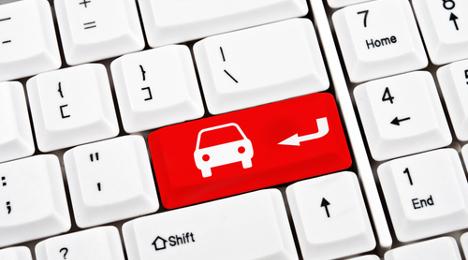If committed, dealers ‘could replicate’ online car retail

By subscribing, you agree to receive communications from Auto Remarketing and our partners in accordance with our Privacy Policy. We may share your information with select partners and sponsors who may contact you about their products and services. You may unsubscribe at any time.
CARY, N.C. –
Seeing an industry disruptor like Carvana file for an initial public offering isn’t necessarily something that gives Mark O’Neil pause.
Such momentum by an online retailer is perhaps a sign that consumers are heading toward the ecommerce route.
Getting away from the profitability aspect, folks gravitate to entities like Carvana “because they offer a process that addresses the pain points in the selling process,” says the Cox Automotive chief operating officer.
“It should be one more indication to the larger dealer community that if offered the opportunity to improve the process, the consumers are going to move to the retailer that offers the improved purchase process,” O’Neil said in a phone interview last week. “It doesn’t scare me, because honestly I think any dealer could replicate, if they’re committed to it, that same process.”
The dealer may not go the same route as Carvana has with things like vehicle vending machines, “but they can clearly the replicate the transparency and ease of transacting very easily,” he said.
“And I think more and more will,” O'Neil said. “I think as competition comes in and they see people moving to competitive models; dealers are very savvy local entrepreneurs, and if they sense there’s an opportunity in their market or they’re losing share in their market by not doing something, I think they’ll jump to it.”
Subscribe to Auto Remarketing to stay informed and stay ahead.
By subscribing, you agree to receive communications from Auto Remarketing and our partners in accordance with our Privacy Policy. We may share your information with select partners and sponsors who may contact you about their products and services. You may unsubscribe at any time.
In comments from O’Neil shared ahead of his speech earlier this month at the Automotive Forum in New York, he said that clicking a button to buy a car is not only the route that the auto wants to go, it’s also the route it should go.
“Click to buy is definitely where we want and need to go in automotive,” O’Neil said in the comments shared in a news release. “Success in retail can only be achieved by giving consumers options that enable the buying experience that they want.”
And that’s the heart of it, he said: it’s what the consumer wants. For most any other transaction a shopper makes, the online option is available.
“We are, as a society — and I’d say all generations — getting used to transacting retail purchases digital,” O’Neil said by phone.
Given the “friction” involved in some steps of the car-buying process (like the trade-in), many consumers would rather conduct parts of the process outside of the dealership. And if provided the chance, “”they’d wholeheartedly embrace it,” he said.
That speaks to their need for a self-directed process where they complete steps of car-buying in the order of their choosing.
A five-step process
Of course, buying a car (online or otherwise) is complex with a lot of moving parts, as O’Neil outlines below. There needs to be:
—A real, actual payment lined up
— Pre-approval from bank
— A “genuine” presentation of all the F&I presentation options, like protection plans, prepaid maintenance, key protection insurance and so forth
— A determination of how trade-in will come into play (i.e. figuring out how money-owed or equity will be considered as part of the deal)
— A method to handle paperwork digitally
At the moment, O’Neil said Cox Automotive is able to handle the first four of the five steps. By year’s end, it will start rolling out complete digital signature capabilities. They can provide that in-store through signing on a digital signature pad in a store, but in fourth quarter they’ll launch the capability to do it via keyboard.
“And I think once that whole seamless process exists — let’s think like Amazon checkout now — then I think we’ll see the adoption,” he said
One hang-up with complete digitization is with state departments of motor vehicles paperwork. Digitization of that paperwork is not universally available across the U.S.
“Because of DMV restraints, getting everything electronic — every single form — is just not going to happen for multiple years, but for most consumers, that’s completely acceptable,” he said. “I would say the vast majority of digital retail contracting for the next few years are going to have some part of the paperwork being signed the old-fashioned way,” largely because some state smay not have their DMV forms ready digitized.
It’s possible to automate most dealer and lender forms, he said. Digitizing DMV forms is something that Cox Automotive will have to “feather” into the solution over time.
Learn from other industries
In the aforementioned comments in the New York speech, O’Neil cites entities like Amazon, Domino’s, Rocket Mortgage and Zappos that have used technology to make a more efficient, transparent, customized and enjoyable buying process.
Cox Automotive argues that doing the same in automotive could bear similar results.
So, what can the auto industry learn from folks who have succeeded (or, conversely, not succeeded) in digital retail?
“I think the learnings from all these folks are, it needs to be intuitive. Whether you’re buying eyeglasses or ordering pizza, there’s no one there to guide you through the process,” O'Neil said. “So, you need to make sure you design your technology in a way is self-evident; it’s intuitive (for) the consumer to figure out themselves.”
The online option, he said, also has to provide additional value for the buyer. In other words, it has to save them time, be transparent and be self-directed/flexible.


